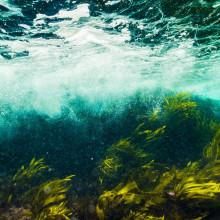What science will thrive in 2025?
In this edition of The Naked Scientists, a look ahead to 2025. We ask experts in the field of health, AI, astronomy, marine science, and archaeology what we should look forward to over the next 12 months…
In this episode

00:57 - What could the UK's 2025 vaping ban look like?
What could the UK's 2025 vaping ban look like?
Linda Bauld, University of Edinburgh
In 2025, the UK is set to introduce strict new laws to restrict and control vaping. The aim is to create what’s called a smoke-free generation, and a large part of it will include a ban on the sale of single-use disposable vapes in England, Wales and Scotland. Here’s Linda Bauld, a professor of public health at the University of Edinburgh…
Linda - So what the bill is going to do, it was previously proposed by the last UK government and has been brought back with the same powers, but also some additional amendments. So there's quite a long list. I'll be brief, I think the headline one is phasing out the sale of tobacco to anyone born after 2009. But there's also quite a range of powers in this bill, which has passed its first readings. It's starting that stage into the other parts of the legislative process to also look at vaping. So vaping, as you and I have discussed before, is an important public health issue. Large numbers of young people who are vaping. So the bill is aiming to have powers to curb youth vaping. And that means doing things like prohibiting branding on vapes that appeal to children, some of the names and the colours and stopping handing out free vapes. Importantly regulating vape contents and flavors, and also looking at how they're displayed and promoted in shops. And then the last bit of this, which is actually a particular interest to me in my research, is a whole bunch of nicotine products that are not medicinally licensed, that are not covered by our existing vaping legislation like nicotine pouches, 'Snus' they're often called, and they'll fall within the bill as well.
Chris - Are they thought to attract the same kind of health dis-benefit as vaping and smoking, these other forms of nicotine use? Or should we be turning more of a blind eye to those and bearing down on the elephant in the room, which is the fact that vapes seem to have crept in, especially in the youth market, and seduced and basically hooked a whole legion of new nicotine addicts.
Linda - Yes, they have. And you're absolutely right. We have a continuum of risk. That's how I describe it. Actually, some of the other nicotine products, particularly nicotine pouches, so-called Snus. Snus is something else, but that's what people call them colloquially. I actually think they are really quite low risk because all you've got in there is the nicotine and, and some of the other ways that the product is packaged. These are things that we know are not harmful. They're also, it's also not breathed in the way you do with vaping, which is one of the reasons why we're concerned about vaping being far less harmful than smoking, but still risks we don't understand. So nicotine pouches are probably not something we should be terribly worried about, but the reason I think it's good to bring them into the legislation, or at least some of the measures in the legislation is because they're very addictive. And the other thing about the pouches is that the level of nicotine in them isn't regulated. And at the moment there's actually no age of sale. So we need to do something on the nicotine pouches. But you're right, if you look at where harm begins, nicotine replacement therapy, licensed medicine are very safe. But you know, some people can get a bit hooked on it through things like pouches, then through to vapes, and then through to the smoked cigarette, which is the most deadly. There's different risks associated with all of these products.
Chris - Are we not slamming the door after the horse has bolted on the vapes though, because it strikes me we're coming to this party so late. They've already got their tentacles into so many young people and we've actually seen rates of uptake go up, go flying up actually, and we are not even at the point where we've banned these things properly yet. China, even China, did it ages ago.
Linda - We do actually have a lot of legislation around vaping already, but clearly it hasn't been enough. And the problem has been that the products have evolved. So we've banned most forms of vaping advertising. We have an age of sale, we have enforcement, we have limits on the nicotine content. We have a health warning on the vape. You know, we did all of that stuff in 2016, but then disposable vapes came on the market, which are very cheap, very attractive. Disposable, as the name says, environmentally harmful. And they actually have been the major driver of youth uptake. So the horse has definitely bolted to the extent that we didn't do enough early enough. But I think taking additional action now will be okay. I would say banning them probably wouldn't be that successful. What the government aims to do with this bill is ban smoking in terms of selling it to children born after 2009. That's the deadliest product. But countries like Australia, which have made vapes only available on prescription have youth vaping rates almost as high as ours. So I think it's about proportional approaches and trying to keep ahead of industry evolution and the evolution of the products. I hope we can do it, but we have to be realistic.
Chris - Totally different topic, but health related. We've had various measures that have been brought in, I think something like 170 policies in the last about 30 years, by successive governments of all colours to try to control obesity, sugar tax included in them. That has got to be one of the health priorities for any year in the years ahead, hasn't it surely?
Linda - Absolutely. And actually I think you're going to see some changes in 2025, but they're not going to be enough for most of us in the public health community. What you're going to see in 2025, I'll just start with Scotland. We're committed to taking action in legislation on multibuys and temporary price promotions of junk food. The UK government is finally going to be bringing in its restrictions on advertising online and on television, particularly on TV in relation to the watershed. The problem is our food supply has changed. We've got big powerful companies that are making products, and it's changed both our diet, but also things like rates of cardiovascular disease, which we know some of the improvements we saw with productions in smoking are largely being reversed because of overweight and obesity. So I hope in 2025 we see more action. It's a public health priority and we need to begin to tackle it.

07:13 - Will ChatGPT-5 launch in 2025?
Will ChatGPT-5 launch in 2025?
Mike Wooldridge, University of Oxford
What might we expect from artificial intelligence in 2025? This year, we are expecting OpenAI ChatGPT-5, the next generation of the AI language model that powers ChatGPT. But will it come to pass? And what might it be able to do? Here’s Mike Wooldridge who is an expert on machine learning at the University of Oxford…
Mike - So just to recall the timeline. GPT-2 was the first notable release in the GPT series. That was about 2018, 2019. GPT-3 was the breakthrough. GPT-3 was the first really, really impressive large scale, large language model that met a large audience. And that was the technology basically that goes into ChatGPT and ChatGPT is November 2022. Then we see GPT-4 rolled out fairly quickly after that, and everybody has been waiting for GPT-5. Now, I've had lots of conversations with colleagues and friends recently, possibly fueled by a few glasses of wine in some cases, about where exactly GPT-5 is. And I've heard flatly contradictory, very confident, but flatly contradictory statements from people about where they think it is. So one view is that the technology has flatlined and that GPT-5, we haven't seen it yet because it just isn't that impressive. And the people who believe that, their beliefs are fueled somewhat by Sam Altman,the CEO of OpenAI behind the company, behind this technology. His statements that the race to scale just making things bigger was not delivering the same level of advantages that it did with GT-3. And so that's fueling this idea that actually GPT-5 hasn't been released because it's a disappointment. So at the same time, I've had very confident statements from colleagues that 'no, no, GPT-5 really is going to be mind blowing', and it's just that OpenAI and co are busy frantically testing it to make sure that it's really, really, really fit for the market so that when it's released, it really does dazzle. So I honestly don't know which of those two statements is true, but a lot I think is riding on it because the expectations are so high.
Chris - Do you think that we will see it in 2025? And what do you in fact see in 2025? Is that big correction that we're considering must be on the cards with this level of investment, this sort of scatter gun approach to investing in so many of these technologies, which is going to bring some companies financially to their knees if they don't discover the golden nugget of this is the use case that everyone wants? Is the reset coming in 2025 or something else exciting?
Mike - Well, I think we will see GPT-5, I think it's unimaginable that we wouldn't see GPT-5 next year. What it will do and what the scope of its capabilities will be is anybody's guess, my guess would be right now that its language capabilities will not be hugely advanced. I think it will still hallucinate. I think it will still get things wrong. We will still start to see, you know, a few days after releasing, we'll start to see on social media people saying, look at this stupid thing that GPT-5 has done. That's my guess is that will all be there. But at the same time, I think what it will probably embrace is different modalities. So where I think that one of the big battlegrounds for generative AI is over the next couple of years, is around multimodal AI. And that means not just text, but text and images. And of course in GPT-4, we've already seen text and images come together. But things like sound, music, video, being able to upload a video and actually having an explanation of what's going on in the video, not just a transcript of the voices in the video. We can do that now, not perfectly, but we can do that now. But actually what's happening in the video, this is a video about a man taking a golf shot and falling over, you know, this kind of explanation. So multimodal I think is where it's really going to be. At some point in the next few years, and maybe even next year, we're going to have generative AI that will be able to take a prompt and generate a TikTok length video to order. TikTok is one of the biggest social media platforms out there right now. And when we have that kind of capability, we're in a different world, a new world, a completely new world of entertainment. So multimodal all of those different modalities. Being able to produce music, and again, we've seen prototype systems that can do this to order, you know, 'I would like a mashup of Joy Division and Ed Sheeran,' you know, something like that, and produce a song that's a mashup of Joy Division and Ed Sheeran, or an Ed Sheeran song in the Style of Joy Division, something like that. All of those different modalities coming together and what people are going to do with that is going to be very weird and very, very wacky, but it's going to take us into a completely new era of entertainment and media consumption. So that, I think, multimodal is where the battleground's going to be. The end point of that, I think, is virtual reality. So, one other thing that we saw was Apple's attempt, they were careful not to call it virtual reality. They called it augmented reality. And the Apple Vision Pro headset. Now it seems like that hasn't been a massive hit. It hasn't been a failure, but it hasn't been a massive hit. But Apple, I don't think, is going to give up on it. I think they will continue and somebody is going to get that technology right. Virtual reality is such a compelling idea. Somebody is going to, somebody is going to get it. Right. And when generative AI comes together with virtual reality, again, I think it's, we're going to be in a completely new era of media and entertainment and we're going to see completely new forms of entertainment produced there.

14:14 - Will we return to the Moon in 2025?
Will we return to the Moon in 2025?
David Whitehouse
What might be in store for space travel in 2025? Well, the answer to that hinges on how much Donald Trump’s incoming administration seeks to utilise NASA and other enterprises like Elon Musk’s SpaceX. We put in a call to space scientist and author David Whitehouse…
David - In the Trump administration, which is no respecter of tradition, and for which success and achievement counts more than heritage, it may well be that Elon Musk is able to overrule many of the directions and programmes that NASA has particularly in its human space program. Because there was a study just released, which showed how America plans to get to the Moon. The astronauts at the moment is going to go to the moon on the Orion capsule. They're going to transfer to the Starship, go down to the surface, and then come up again and transfer back to the Orion capsule to come back to Earth. When that plan was actually put in visual terms and we saw pictures of it, people started saying, but Orion is tiny, Starship is enormous. This doesn't look right, this doesn't look compatible. This looks very strange.' Now either that's the way to go to the Moon, or it's telling us something about meshing the government's expensive long-term space effort to go to the moon with Elon Musk's nimbler, faster, more risky approach. Elon Musk has launched more than anybody else put together into space. His Starship could be launched 5, 6, 7, 8, 9, 10 times a year as you get going. The space launch system that launches the Orion capsule, that's to take astronauts to the Moon, probably cannot launch more than once every two years. So these are two very incompatible systems that people are beginning to realise that perhaps even though power is too much with Elon Musk, one would argue, he might be the way to get back to the moon before the Chinese.
Chris - You've written some really powerful words because you said 2025 will be the most important year in human space flight since 1969. Very, very powerful. What do you think is going to happen then in 2025 to justify those words?
David - Well, I think this is the year of decisions. This is about how to go back to the Moon. Since we've been to the Moon, we've had basically the space shuttle and the space station. And the space shuttle we know was a flawed system and we are going to have to face Elon Musk's, one of its big tasks, is going to have to face the same problem as the space shuttle had when putting people on board his Starship. Because the Starship is a capsule and when he does put people on board it seems that he wants to design it for a crude flight relatively quickly. His main problem is that at the moment there doesn't seem to be an abort system in the sense that the crew are inside the capsule and the rocket and the capsule are next to each other as was the space shuttle. And when Challenger blew up, the crew had no way to get out. So he has got to address when he puts people on board the star ship. And that's part of going back to the Moon because, at the current plan, the crew will transfer to the star ship to go down to the Moon's surface and come back again. He's got to work out the safety issues of that. And that is going to be very difficult no matter what his ability to send the Starship around the solar system. And we expect to see him send an un crewed one to Mars in the next couple of years. That is a fundamental human safety problem that he is going to face. But success is everything at the moment with the Trump administration and the decisions for going back to the Moon. For what capsules America uses and how it explores the solar system will probably be made this year. Because at the moment you have the Starship, the up and coming what could be a very versatile, very powerful spaceship to take people into space, to the Moon and possibly onto Mars. You have got the Dragon capsule, which is also SpaceX that takes people up to and from the Space station. You've got Boeing's Starliner capsule, which had all these problems and wasn't able to bring the crew back from the Space Station earlier this year because they had problems with the thrusters and those are still not resolved. And you've got the expensive and capable Orion capsule that is going to take astronauts to the Moon and is complicated and has problems with its heat shield at the moment. So those overlooking the American space program and Trump will say this to Musk. Musk will say, how come we have the Starship Starliner, Dragon, and Orion? Do we need four ways to put American astronauts into space? Surely with wanting to save money and be more efficient and achieve more, which is what SpaceX has shown us it can do, something's got to go. So I would argue big decisions this year, next year and the year after. And that will set the agenda and the goal, the technological direction to go back to the moon, which I think is going to be much later than we thought now, and possibly onto Mars.

19:58 - How will climate change affect the oceans in 2025?
How will climate change affect the oceans in 2025?
Liberty Denman, KAI
2025 is projected to be the hottest on record, which is something of a trend in recent years. But what effect do we anticipate it having on the marine sphere, and what, if anything, are people doing to protect us and marine life from the harshest of its effects? Will Tingle has been speaking with marine science communicator, and host of the Out of Our Bubble podcast, Liberty Denman…
Liberty - I think it's going to be all eyes on COP. And that's not just the COP for climate, but also for biodiversity. This is something that I think they've suffered a lot of backlash, both in the contents of what comes out of COP, but also the locations that they've been hosted in the last couple of years. I think ultimately what we are waiting to see is that action, both the biodiversity and the climate side of it, and seeing the countries having the political courage to make the moves to do that. I think conservation suffers so much in the political spaces because ultimately political terms are short and so politicians think short term, but unfortunately the natural world and conservation doesn't work on four year terms or two year terms depending on where you're looking. It's something that needs to have that long-term view. And unfortunately, I think that's something that it really suffers from because when you're constantly changing things, it's very difficult to see that long-term impact. So I think that's really where we want to be looking for the ocean. It's seeing that commitment to long-term protection, whether it's for specific areas of ocean under that kind of MPA framework or targeted areas for specific species protections for different areas, different species, depending on what's necessary, I think is really where we want to be turning our attention to in 2025.
Will - And the elephant in the room whenever you talk about conservation is of course climate change, 2025. Some people predicting it is going to be, again, the hottest here on record that kind of feels meaningless at this stage.
Liberty - Consistently beating ourselves every year. We love the competition with ourselves.
Will - <laugh>. We are outdoing ourselves here. I mean, I feel like this is an obvious yes, but how will that potentially have impacts on the ocean?
Liberty - Let's just imagine you are stuck in a bath where the water is really, really hot and there's no way out for you. How's it going to impact you? You're going to be sweating, feeling a bit sick, dehydrated, probably also a load of other things that I'm not thinking about. But ultimately it's that same concept. The animals and ecosystems within the ocean can't go anywhere and that ocean is warming and that could look very different depending on what areas you're looking at or what species you're looking at. I mean, generally speaking, as the ocean warms, that will cause a sea level rise. But it will also cause a change in the chemistry, making it hard for things like crustaceans and crabs to maintain their shells. Warm ocean also decreases its ability to hold oxygen, which causes a need for animals to shift where they are. What about the animals that are sessile? They can't move. Where do they go? What happens to them? And that ultimately can cause range shifts in species. And that doesn't even just have to be because of oxygen minimum zones that can be because of the temperature. So for example, the lobster fishery in Scotland is normally particularly active around June and July, and we're starting to see that range expanding to more of the year, which is something that has been historically unheard of.
Will - To put my pessimist hat on just for a moment, obviously just for a moment. I'm sunshine and rainbows for most of the day. When we talk about marine protected areas and we wax lyrical about them in the look back at 2024, how can they even hope to reconcile a fraction of the damage that we know is going to be caused by this behemoth of climate change?
Liberty - That's a very good question. I mean, how you define a vulnerable area to protect does, again, completely depend on the classic science cop-out answer - It depends. Depends on what you want to be protecting. But to cover the broad strokes, what we're actually talking about is the fact that nature-based solutions are actually where we're starting to look. We as we kind of realised, especially over Covid, as we kind of left things alone, nature kind of started coming back. There were all those headlines like we're seeing dolphins in these rivers and all of these different things were starting to reappear as we kind of receded our impact on those areas because we weren't allowed outside for any more than an hour a day. And so I think what that really did show us is that nature-based solutions and if we can leave nature alone in that way, it will recover. It's just how do we actually make that work in a society that isn't functioning under the power of Covid? And so marine protected areas are obviously a super important part of that literally come just designating an area to leave alone to recover because then that allows the spillover effect into those areas that aren't protected, which means that we will have increased fishing abilities, increased ecotourism, perhaps more resources to use all of these different things. And so ultimately that's what we need to be doing for that collaboration across different sectors, showcasing the mutual benefit of protecting these regions and how it's going to be useful to everyone. And also understanding that you don't just have to be in marine conservation to be able to make a difference in this. You know, blue finance is becoming increasingly something we speak about. How can we actually inject money into the conservation sector that is so chronically underfunded and therefore difficult to protect because it doesn't have the same financial benefit. Protecting kelp forests and seagrass doesn't have the same financial benefits as it does tearing mangroves down for a hotel. And so that's what we need to understand is where that middle ground is so we can ultimately be benefiting from nature in the way that we do every day and perhaps even putting a financial value on that so that we can kind of understand that in the western world of how we hold value.
Will - So a great deal of cooperation and cohesion is going to be required.
Liberty - Definitely. I think that is going to be the biggest thing that we all need is collaboration moving forwards. Absolutely.

What will archaeology unearth in 2025?
Emma Pomeroy, University of Cambridge
AI is set to have another huge year across many scientific fields. So how much of a gamechanger is it in archaeology? Emma Pomeroy explains that, and what else she is getting up to in 2025…
Emma - I think this is a really exciting development and I'm sure we'll see more of this in the years to come. But essentially by using things like LiDAR, where you're using kind of light that bounces back from the ground when you are sort of flying over it, or sending a drone over a particular area, it can almost let us see things that we couldn't see before. So using this sort of technology where you send up a balloon with a camera or something, I mean, that's been done for a very long time in archaeology. And then you can see structures on the ground. But some places that's really hard to do. For example, in tropical forests where you've got very heavy plant coverage or for example at high altitude where it's not so easy to get there. And there's been a number of really interesting studies this year, and I'm sure more to come, that have used this technology to kind of see through those tropical forests or to look at places that are much more inaccessible and show us really exciting things about sites of kind of scale that we wouldn't necessarily have predicted or been able to study before.
Chris - And what's in your diary for 2025? You've normally got somewhere exotic to go and something ancient to dig up. More of the same?
Emma - Yes. So hopefully we'll be going back to Shanidar Cave in Iraqi Kurdistan for more excavations there. We've been working extensively over the past 10 years now, finding Neandertal remains, but also trying to understand the behaviour of Neandertals and more recent modern humans. And we're hoping to go back there to focus on this period where we have a transition between Neanderthals using the cave and the first modern humans turning up to really try and understand what that sort of transition looks like. Are they there completely separately from one another? Are they perhaps overlapping in time, alternating in their use of the cave? So that's one of our big targets for the coming year.










Comments
Add a comment